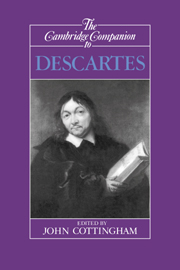Book contents
- Frontmatter
- Introduction
- 1 Descartes' life and the development of his philosophy
- 2 Descartes and scholasticism
- 3 The nature of abstract reasoning
- 4 Cartesian metaphysics and the role of the simple natures
- 5 The Cogito and its importance
- 6 The idea of God and the proofs of his existence
- 7 The Cartesian circle
- 8 Cartesian dualism
- 9 Descartes' philosophy of science and the scientific revolution
- 10 Descartes' physics
- 11 Descartes' physiology and its relation to his psychology
- 12 Descartes on thinking with the body
- 13 The reception of Descartes' philosophy
- Bibliography
- Index
4 - Cartesian metaphysics and the role of the simple natures
Published online by Cambridge University Press: 28 May 2006
- Frontmatter
- Introduction
- 1 Descartes' life and the development of his philosophy
- 2 Descartes and scholasticism
- 3 The nature of abstract reasoning
- 4 Cartesian metaphysics and the role of the simple natures
- 5 The Cogito and its importance
- 6 The idea of God and the proofs of his existence
- 7 The Cartesian circle
- 8 Cartesian dualism
- 9 Descartes' philosophy of science and the scientific revolution
- 10 Descartes' physics
- 11 Descartes' physiology and its relation to his psychology
- 12 Descartes on thinking with the body
- 13 The reception of Descartes' philosophy
- Bibliography
- Index
Summary
In the Regulae, in first part of Rule XII, Descartes characterizes “ideas” in terms of “figures” or “shapes” formed in the imagination (AT X 414: CSM I 41), thus reworking in a fairly precise, if critical, fashion the doctrines of Aristotle's De Anima. But in the second part of Rule XII, he abandons this seemingly cautious use of the traditional framework, and introduces an utterly new concept, that of the “simple nature” (natura simplicissima; res simplex). This is not only, or primarily, a terminological innovation; what is involved is an epistemological revolution.
A simple nature has two characteristic features: it is neither simple, nor a nature. It is, first of all, opposed to "nature," since in place of the thing considered in itself, according to its ousia (essence), or physis (nature), it denotes the thing considered in respect of our knowledge: "when we consider things in the order that corresponds to our knowledge of them (in ordine ad cognitionem nostram) our view of them must be different from what it would be if it were speaking of them in accordance with how they exist in reality" (AT X 418: CSM 144).
- Type
- Chapter
- Information
- The Cambridge Companion to Descartes , pp. 115 - 139Publisher: Cambridge University PressPrint publication year: 1992
- 13
- Cited by

